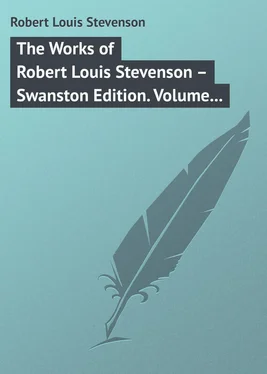Robert Stevenson - The Works of Robert Louis Stevenson – Swanston Edition. Volume 18
Здесь есть возможность читать онлайн «Robert Stevenson - The Works of Robert Louis Stevenson – Swanston Edition. Volume 18» — ознакомительный отрывок электронной книги совершенно бесплатно, а после прочтения отрывка купить полную версию. В некоторых случаях можно слушать аудио, скачать через торрент в формате fb2 и присутствует краткое содержание. Жанр: foreign_prose, на английском языке. Описание произведения, (предисловие) а так же отзывы посетителей доступны на портале библиотеки ЛибКат.
- Название:The Works of Robert Louis Stevenson – Swanston Edition. Volume 18
- Автор:
- Жанр:
- Год:неизвестен
- ISBN:нет данных
- Рейтинг книги:3 / 5. Голосов: 1
-
Избранное:Добавить в избранное
- Отзывы:
-
Ваша оценка:
- 60
- 1
- 2
- 3
- 4
- 5
The Works of Robert Louis Stevenson – Swanston Edition. Volume 18: краткое содержание, описание и аннотация
Предлагаем к чтению аннотацию, описание, краткое содержание или предисловие (зависит от того, что написал сам автор книги «The Works of Robert Louis Stevenson – Swanston Edition. Volume 18»). Если вы не нашли необходимую информацию о книге — напишите в комментариях, мы постараемся отыскать её.
The Works of Robert Louis Stevenson – Swanston Edition. Volume 18 — читать онлайн ознакомительный отрывок
Ниже представлен текст книги, разбитый по страницам. Система сохранения места последней прочитанной страницы, позволяет с удобством читать онлайн бесплатно книгу «The Works of Robert Louis Stevenson – Swanston Edition. Volume 18», без необходимости каждый раз заново искать на чём Вы остановились. Поставьте закладку, и сможете в любой момент перейти на страницу, на которой закончили чтение.
Интервал:
Закладка:
There could be nothing more natural than these apprehensions, nor anything more groundless. In my experience of the islands, I had never again so menacing a reception; were I to meet with such to-day, I should be more alarmed and tenfold more surprised. The majority of Polynesians are easy folk to get in touch with, frank, fond of notice, greedy of the least affection, like amiable, fawning dogs; and even with the Marquesans, so recently and so imperfectly redeemed from a blood-boltered barbarism, all were to become our intimates, and one, at least, was to mourn sincerely our departure.
CHAPTER II
MAKING FRIENDS
The impediment of tongues was one that I particularly over-estimated. The languages of Polynesia are easy to smatter, though hard to speak with elegance. And they are extremely similar, so that a person who has a tincture of one or two may risk, not without hope, an attempt upon the others.
And again, not only is Polynesian easy to smatter, but interpreters abound. Missionaries, traders, and broken white folk living on the bounty of the natives, are to be found in almost every isle and hamlet; and even where these are unserviceable, the natives themselves have often scraped up a little English, and in the French zone (though far less commonly) a little French-English, or an efficient pidgin, what is called to the westward “Beach-la-Mar,” comes easy to the Polynesian; it is now taught, besides, in the schools of Hawaii; and from the multiplicity of British ships, and the nearness of the States on the one hand and the colonies on the other, it may be called, and will almost certainly become, the tongue of the Pacific.
I will instance a few examples. I met in Majuro a Marshall Island boy who spoke excellent English; this he had learned in the German firm in Jaluit, yet did not speak one word of German. I heard from a gendarme who had taught school in Rapa-iti that while the children had the utmost difficulty or reluctance to learn French, they picked up English on the wayside, and as if by accident. On one of the most out-of-the-way atolls in the Carolines, my friend Mr. Benjamin Hird was amazed to find the lads playing cricket on the beach and talking English; and it was in English that the crew of the Janet Nicoll , a set of black boys from different Melanesian islands, communicated with other natives throughout the cruise, transmitted orders, and sometimes jested together on the fore-hatch. But what struck me perhaps most of all was a word I heard on the verandah of the Tribunal at Noumea. A case had just been heard – a trial for infanticide against an ape-like native woman; and the audience were smoking cigarettes as they awaited the verdict. An anxious, amiable French lady, not far from tears, was eager for acquittal, and declared she would engage the prisoner to be her children’s nurse. The bystanders exclaimed at the proposal; the woman was a savage, said they, and spoke no language. “ Mais vous savez ,” objected the fair sentimentalist; “ ils apprennent si vite l’anglais !”
But to be able to speak to people is not all. And in the first stage of my relations with natives I was helped by two things. To begin with, I was the showman of the Casco . She, her fine lines, tall spars, and snowy decks, the crimson fittings of the saloon, and the white, the gilt, and the repeating mirrors of the tiny cabin, brought us a hundred visitors. The men fathomed out her dimensions with their arms, as their fathers fathomed out the ships of Cook; the women declared the cabins more lovely than a church; bouncing Junos were never weary of sitting in the chairs and contemplating in the glass their own bland images; and I have seen one lady strip up her dress, and, with cries of wonder and delight, rub herself bare-breeched upon the velvet cushions.
Biscuit, jam, and syrup was the entertainment; and, as in European parlours, the photograph album went the round. This sober gallery, their everyday costumes and physiognomies, had been transformed, in three weeks’ sailing, into things wonderful and rich and foreign; alien faces, barbaric dresses, they were now beheld and fingered, in the swerving cabin, with innocent excitement and surprise. Her Majesty was often recognised, and I have seen French subjects kiss her photograph; Captain Speedy – in an Abyssinian war-dress, supposed to be the uniform of the British army – met with much acceptance; and the effigies of Mr. Andrew Lang were admired in the Marquesas. There is the place for him to go when he shall be weary of Middlesex and Homer.
It was perhaps yet more important that I had enjoyed in my youth some knowledge of our Scots folk of the Highlands and the Islands. Not much beyond a century has passed since these were in the same convulsive and transitionary state as the Marquesans of to-day. In both cases an alien authority enforced, the clans disarmed, the chiefs deposed, new customs introduced, and chiefly that fashion of regarding money as the means and object of existence. The commercial age, in each, succeeding at a bound to an age of war abroad and patriarchal communism at home. In one the cherished practice of tattooing, in the other a cherished costume, proscribed. In each a main luxury cut off: beef, driven under cloud of night from Lowland pastures, denied to the meat-loving Highlander; long-pig, pirated from the next village, to the man-eating Kanaka. The grumbling, the secret ferment, the fears and resentments, the alarms and sudden councils of Marquesan chiefs, reminded me continually of the days of Lovat and Struan. Hospitality, tact, natural fine manners, and a touchy punctilio, are common to both races: common to both tongues the trick of dropping medial consonants.
Here is a table of two widespread Polynesian words: —

1Where that word is used as a salutation I give that form.
The elision of medial consonants, so marked in these Marquesan instances, is no less common both in Gaelic and the Lowland Scots. Stranger still, that prevalent Polynesian sound, the so-called catch, written with an apostrophe, and often or always the gravestone of a perished consonant, is to be heard in Scotland to this day. When a Scot pronounces water, better, or bottle — wa’er, be’er , or bo’le – the sound is precisely that of the catch; and I think we may go beyond, and say, that if such a population could be isolated, and this mispronunciation should become the rule, it might prove the first stage of transition from t to k , which is the disease of Polynesian languages. The tendency of the Marquesans, however, is to urge against consonants, or at least on the very common letter l , a war of mere extermination. A hiatus is agreeable to any Polynesian ear; the ear even of the stranger soon grows used to these barbaric voids; but only in the Marquesan will you find such names as Haaii and Paaaeua , when each individual vowel must be separately uttered.
These points of similarity between a South Sea people and some of my own folk at home ran much in my head in the islands; and not only inclined me to view my fresh acquaintances with favour, but continually modified my judgment. A polite Englishman comes to-day to the Marquesans and is amazed to find the men tattooed; polite Italians came not long ago to England and found our fathers stained with woad; and when I paid the return visit as a little boy, I was highly diverted with the backwardness of Italy: so insecure, so much a matter of the day and hour, is the pre-eminence of race. It was so that I hit upon a means of communication which I recommend to travellers. When I desired any detail of savage custom, or of superstitious belief, I cast back in the story of my fathers, and fished for what I wanted with some trait of equal barbarism: Michael Scott, Lord Derwentwater’s head, the second-sight, the Water Kelpie – each of these I have found to be a killing bait; the black bull’s head of Stirling procured me the legend of Rahero ; and what I knew of the Cluny Macphersons, or the Appin Stewarts, enabled me to learn, and helped me to understand, about the Tevas of Tahiti. The native was no longer ashamed, his sense of kinship grew warmer, and his lips were opened. It is this sense of kinship that the traveller must rouse and share; or he had better content himself with travels from the blue bed to the brown. And the presence of one Cockney titterer will cause a whole party to walk in clouds of darkness.
Читать дальшеИнтервал:
Закладка:
Похожие книги на «The Works of Robert Louis Stevenson – Swanston Edition. Volume 18»
Представляем Вашему вниманию похожие книги на «The Works of Robert Louis Stevenson – Swanston Edition. Volume 18» списком для выбора. Мы отобрали схожую по названию и смыслу литературу в надежде предоставить читателям больше вариантов отыскать новые, интересные, ещё непрочитанные произведения.
Обсуждение, отзывы о книге «The Works of Robert Louis Stevenson – Swanston Edition. Volume 18» и просто собственные мнения читателей. Оставьте ваши комментарии, напишите, что Вы думаете о произведении, его смысле или главных героях. Укажите что конкретно понравилось, а что нет, и почему Вы так считаете.










